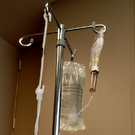Articles tagged with: Kepivance
NewsFlash »
Fewer Injection Site Reactions With Subcutaneous Velcade Administered To The Abdomen Instead Of The Thigh - Japanese researchers recently found that subcutaneous (under the skin) injections of Velcade (bortezomib) in the abdomen cause fewer injection site reactions compared to injections in the thigh. According to the Japanese researchers, the higher rates seen with injections to the thigh may be because the thigh contains less fat tissue than the abdomen. Based on their findings, they recommend administering subcutaneous Velcade to the abdomen, particularly in the case of thin patients. For more information, please see the study in The European Journal of Haematology (abstract).
Cereblon Levels May Affect Effectiveness Of Thalidomide – Results of a European retrospective analysis indicate that levels of the protein cereblon in patients’ myeloma cells may impact the efficacy of thalidomide (Thalomid). The researchers found that newly diagnosed multiple myeloma patients with high cereblon levels who received thalidomide maintenance had longer progression-free survival times than those with low cereblon levels. The researchers did not observe any association between cereblon levels and the effectiveness of Velcade maintenance therapy. Previous studies have shown that cereblon is necessary for the immunomodulatory drugs -- particularly Revlimid (lenalidomide) and pomalidomide -- to be effective against multiple myeloma (see related Beacon news article). For more information, please see the study in the journal Blood (abstract).
Latest Findings Show Kepivance May Not Decrease Mouth Ulcers In Myeloma Patients Undergoing High-Dose Chemotherapy – In contrast to previous findings, results from a recent Dutch study show that Kepivance (palifermin) has no effect on mouth ulcers in multiple myeloma receiving high-dose melphalan (Alkeran) prior to stem cell transplantation using their own stem cells. In the Dutch study, patients who received Kepivance had similar rates of mouth ulcers as patients who received a placebo. For more information, please see the study in the journal Bone Marrow Transplant (abstract).
Study Finds Association Between Myeloma And Certain Occupations – Results of another European analysis suggest that farmers, cleaning workers, and, to a certain extent, printers have an increased risk of developing multiple myeloma. The European researchers also found that pesticide exposure over a period of 10 years or more increased the risk of developing multiple myeloma. For more information, please see the study in the Journal of Occupational Medicine and Toxicology (pdf, full text).
News»

The results of a Phase 1 study show that Kepivance reduces the severity of melphalan-related mouth ulcers in multiple myeloma patients. Due to better tolerability, the melphalan dosage could be safely increased to 280 mg/m2 prior to a stem cell transplant.
Almost two-thirds of the patients, who all had normal kidney function, had responded to the regimen at 100 days post transplant. The study investigators point out, however, that a Phase 2 trial will be necessary to better determine the efficacy of this regimen.
High-dose chemotherapy followed by autologous stem cell transplantation …
News»

A new study indicates that a short-course treatment with Kepivance (palifermin) prior to high-dose chemotherapy and stem cell transplantation may be sufficient to decrease mouth ulcers and the supportive care required by multiple myeloma patients after a stem cell transplant.
In multiple myeloma patients under the age of 65, high-dose chemotherapy followed by an autologous stem cell transplant is the preferred and most effective treatment option. However, the high dose of chemotherapy often causes severe side effects such as oral mucositis, which occurs when the mucous lining inside the mouth becomes inflamed …

